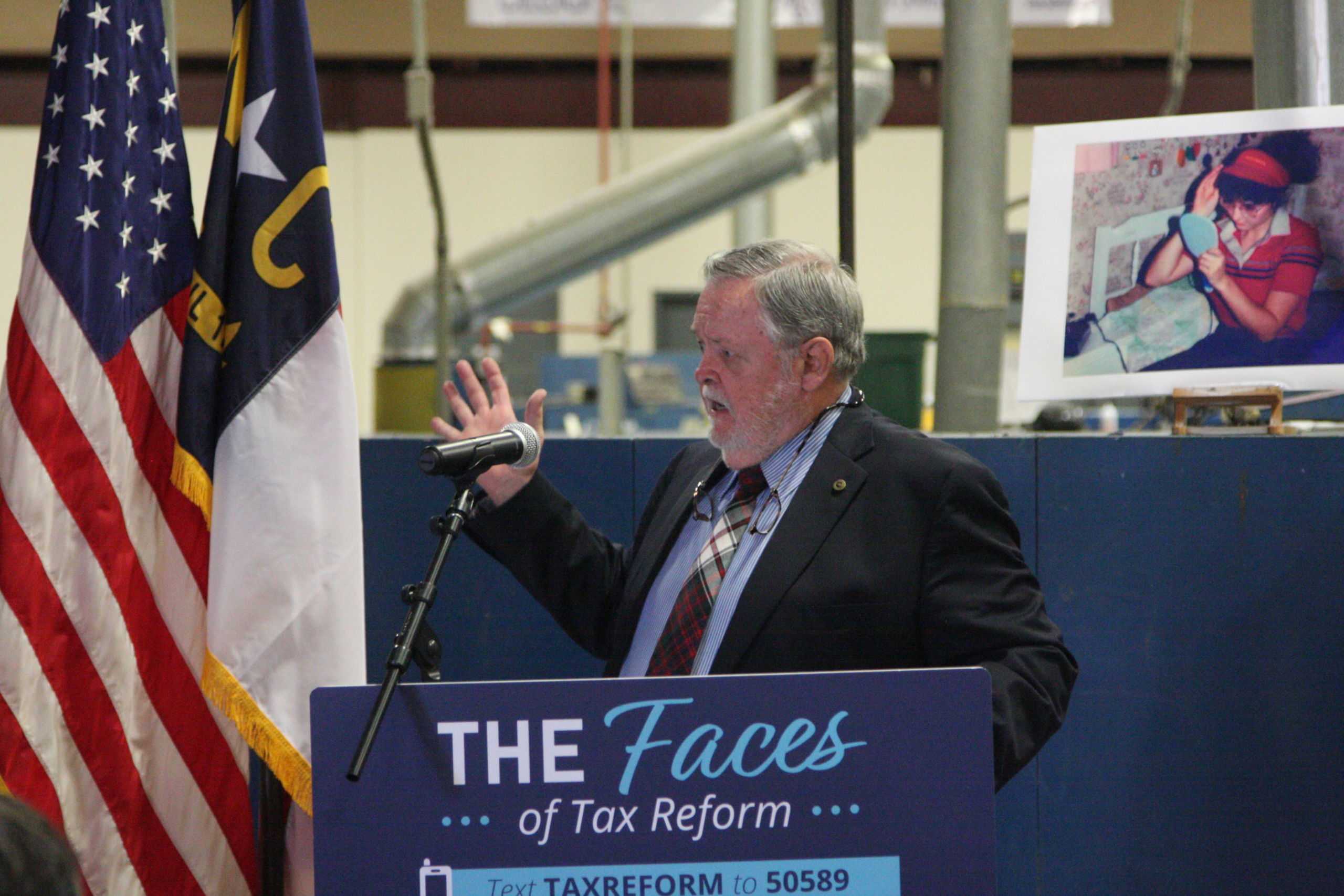HOPE MILLS — On Thursday John Buie accompanied the management team from JEB Designs to a trade show in Charlotte to inspect a $60,000 machine for his small screen-printing/embroidery company.
The next day Buie, the firm’s chief financial officer, hosted Republican U.S. Reps. Richard Hudson of North Carolina’s 8th Congressional District and Cathy McMorris Rodgers of Washington to hear about federal tax reform that could let his company buy that machine, and add jobs.
The elected officials enthusiastically pitched the plan, expected to be rolled out this week, as pro-family and pro-growth, with a hint of America First elements. With last week’s agreement in the House to pass the Senate budget plan, tax reform could be completed in early December, they said.
McMorris Rodgers and Hudson added tax reform gives the GOP-led Congress an opportunity to show it can work quickly and publicly to fulfill a campaign promise — unlike their politically disastrous failures to repeal and replace the Affordable Care Act.
“I think one of the big lessons is for us to be unified as much as possible when we do that rollout,” she said. The House, Senate, and Trump administration have been working on a plan for months, she said, and that will have a positive impact.
“We want people to have higher wages, more job opportunities, and we want to bring jobs back to America, and we want to simplify the tax process for most Americans,” Hudson said.
“This is our moment, a once-in-a-generation opportunity to enact tax reform,” McMorris Rodgers said. As chairwoman of the House Republican Conference, McMorris Rodgers is the highest-ranking woman in Congress.

Buie liked what he heard at the closed-invitation event on the company’s shop floor.
“We have ideas of expanding,” Buie said. “That’s all part of what we think tax reform and revision will bring to us” and the rest of North Carolina.
Hudson and McMorris Rodgers explained how tax reform could aid the company’s expansion plans.
McMorris Rodgers said the first version of tax reform probably would lower the corporate tax rate to 20 percent, below the 22.5 percent average of the industrialized world. President Trump could challenge Congress to meet his preferred 15 percent rate, she said.
Hudson said the framework would allow businesses like JEB Designs to write off 100 percent of new capital investments starting in the first year, but allowing five years to claim the deduction.
The outlined proposal cuts the top tax rate for small and family-owned businesses to 25 percent, and shrinks the current seven individual tax brackets to three: 12 percent, 25 percent, and 35 percent. It would end the estate tax. And it would repeal the individual alternative minimum tax, which requires millions of taxpayers to prepare tax returns twice and pay the higher amount owed, either the AMT or the regular income tax.
Hudson said another goal is to shelve a tax preparation system that requires 2.6 billion hours of Americans’ time each year, and replace it with a tax return that could be filed on a postcard or using a smartphone app.
“We’re going to streamline the tax code so that it levels the playing field,” McMorris Rodgers said. She said a simpler tax code would boost employment and help those with jobs get better ones.
Many details remain unresolved. Republicans have failed to agree on a final outline and Democrats aren’t on board. Even so, Hudson and McMorris Rodgers expressed confidence Friday the plan would go forward.
She said reviews of the tax plan by Trump’s Council of Economic Advisers suggests it could increase wages 8 percent. Hudson said the average family would see as much as a $4,000 boost in income.
Other economists have challenged those projections, or said they would occur over a number of years rather than immediately.
Unlike Obamacare repeal bills that were written behind closed doors by legislative leaders, tax reform is moving on parallel tracks between the House and Senate. The House Ways and Means Committee and Senate Finance Committee are expected to work on them publicly soon after the plan rolls out this week.
The goal: Pass the bill through Ways and Means the second week of November and bring it to the floor the third week of November at the same time the Senate Budget Committee reviews it. The bill should pass the House before Thanksgiving, go to a conference committee in early December, and reach President Trump before Christmas.
McMorris said it is unfair that Americans will spend more on taxes this year than on food, clothing, and housing combined. The tax reform proposal also is designed to be simpler by getting rid of loopholes and exemptions.
Hudson noted the difficulty of killing deductions. He said, “every loophole in the tax code has a lobbyist attached to it, and those lobbyists represent real people back home.”
The standard deduction would double, to $24,000 for married couples filing jointly, and $12,000 for single filers. Taxpayers earning at or below those amounts would pay no income taxes. The home mortgage and charitable deductions would remain, but many others would be scrapped.
While McMorris Rodgers and Hudson encourage people to save for retirement using tax-exempt 401(k) and IRA programs, and oppose limiting those exemptions, they would not rule out approving a tax reform bill that included limits if it was the only way to get a tax reform bill through Congress and to Trump.